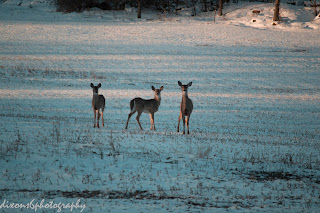Over the last couple of years - but more so within the last several months - I've been slowly learning how to properly use my camera and I've been teaching myself the art of photography. I've come a long way from where I began and it has been an amazing 'wellness tool' for the times that I begin to slip or am not feeling my greatest; picking up the camera has become a comfort to me. When someone asked me why it is a good tool or why it brings me joy, the best explanation that I could give was that the world looks different through the lens of the camera. It's amazing how you can compose a shot to allow it to give a desired impression, the final output different than what your eyes might actually see.
Using the photographs below it is a little bit easier to see what I mean: the first image (the original in this case) shows a closer to realistic view of some deer I captured yesterday morning. I've used photoshop to demonstrate some of the changes I can choose to make to give a desired outcome - usually done directly at the camera.
In the second image I have straightened the photo, cropped it down slightly to zoom in on the subject matter.
Next, I chose to brighten up the image and change the white balance and the saturation - the amount of colour used.
Finally, I adjusted a few of the other settings - highlights, shadows, etc... to make the image appear the way that I would like it to look.
Like I said above, I generally try to adjust all of these settings directly at the camera, By straightening the camera body - setting the white balance, the shutter speed, etc, it allows me to control the output, the final image and what I see when I look back. In the same way, there are a dozen different things that the camera can't capture - the kids screaming at me in the background as they try and get ready for school, the biting cold of the wind as it whips around my hair and causes me to shiver, the sun as it peeks over the horizon, or the sound of the cars racing down my street. Instead, the final product leaves a peaceful, quiet, maybe slightly chilly impression... much like mental health.
I think this is why I like photography so much. When you have a mental health problem - the world seems different at times, like you have applied a filter to your lens and the white balance is off and the exposure is a little too dark or light, and the colours seem skewed - too brilliant or too montotone. It is impossible to see the picture the way that everyone else does because the settings in your mind, just aren't quite right. As we process - sometimes we can adjust those settings, make our output seem a little more 'normal', but the input is still off, wrong somehow.
Just like a photographer learns how to use a camera - to adjust settings as they go to get the picture right, we learn to use tools to adjust our internal settings. Therapy, medications, exercise and nutrition, relationships - they all adjust something within us, help the camera to work and to get a clearer image. Sometimes, the external settings change - triggers happen or the surroundings change - sometimes the camera body needs updating... and so we adjust. We try new tools, new medications, and new therapies to continue to adjust ourselves. Sometimes we slip. Sometimes we can't get the image in focus no matter what settings we change - there are too many factors, maybe there isn't enough light, or too many filters attached to the front of our lens. That's when we need help the most - when we need relationships and support to help us to see clearly through the fog, the layers, to take control and manually adjust the settings.
The good news is that even though things need to be adjusted from time to time - we aren't broken. It might appear at times as though there is a crack in the screen, splintering out and distorting things, but fixing it is possible as long as we (with help as needed) remove the broken filter,




No comments:
Post a Comment